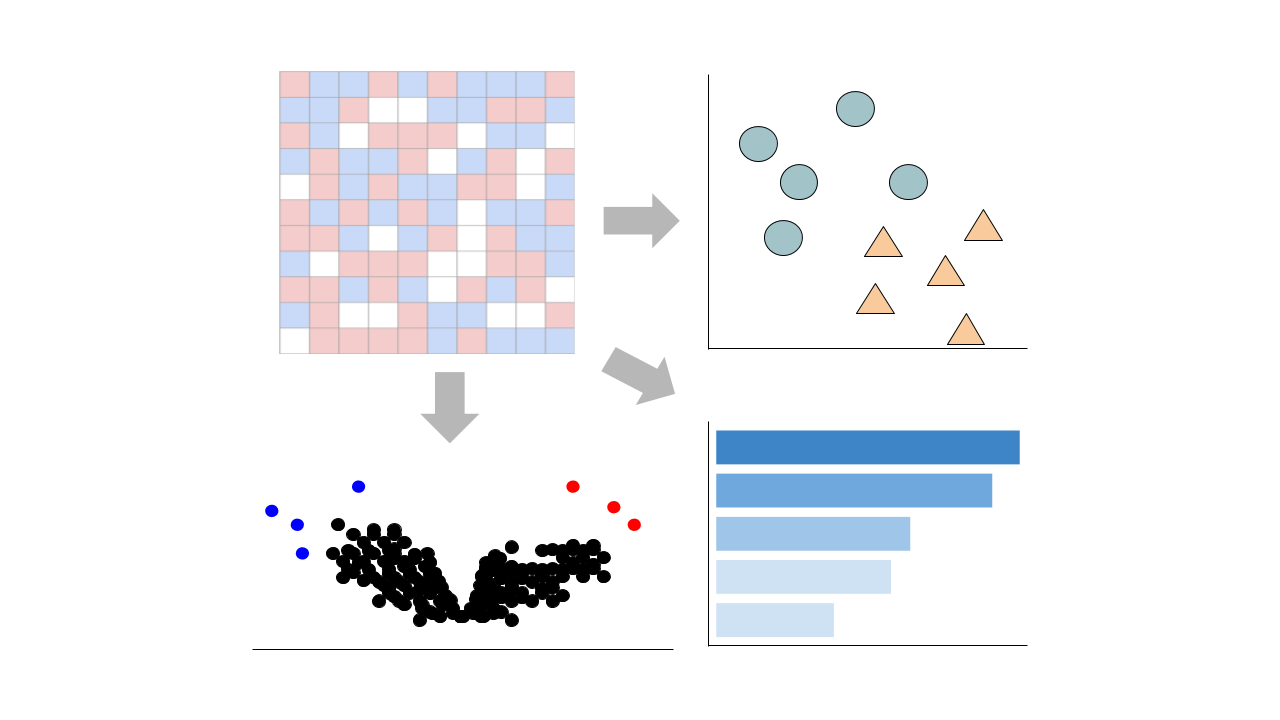 Gene counts are sourced from ARCHS4, which provides uniform alignment of GEO samples.
You can learn more about ARCHS4 and its pipeline here.
Gene counts are sourced from ARCHS4, which provides uniform alignment of GEO samples.
You can learn more about ARCHS4 and its pipeline here.
Select conditions below to toggle them from the plot:
| GROUP | CONDITION | SAMPLES |
|---|---|---|
| hippocampus |
GSM3573174 GSM3573175 GSM3573176 GSM3573177 GSM3573178 GSM3573179 GSM3573180 GSM3573181 GSM3573182 GSM3573183 GSM3573184
|
|
|
GSM3573185 GSM3573186 GSM3573187 GSM3573188 GSM3573189 GSM3573190 GSM3573191 GSM3573192 GSM3573193 GSM3573194 GSM3573195 GSM3573196 GSM3573197 GSM3573198 GSM3573199 GSM3573200 GSM3573201 GSM3573202 GSM3573203 GSM3573204
|
Submission Date: Jan 21, 2019
Summary: We reported a 28-day Intermittent fasting (IF) regimen improved cognitive deficits in db/db mice via a microbiota-metabolites-brain axis assessed by behavioral tests and multiple-omics analysis (transciptomics, 16S rRNA sequencing and metabolomics). Here we present transcriptomics data of mice hippocampus. A total of 310.85Gb clean RNA-SEQ reads of all mice with an average depth of 3.86x were obtained and were then mapped against the Mus musculus genome to obtain the gene expression FPKM values for each sample. We detected 27,094 genes (including 1,345 new predicted genes with no annotation) with FPKM value. Among them, 1,181 genes were found to be only highly expressed in db/db-IF mice compared to db/db and db/m mice, using Differentially Expressed Genes (DEG) analysis, most of which enriched in mitochondrial-related GO terms. Besides, IF strongly elevated genes related to KEGG pathway of oxidative phosphorylation (OXPHOS) via up-regulating mitochondrial located genes expression. In consistent with results from RNA-sequencing analysis, the qPCR analysis confirmed that mitochondrial and metabolic genes expressed were upregulated by IF in db/db mice. In conclusion, IF regimen significantly enhanced mitochondrial and energy metabolism related genes expressions in diabetic mice hippocampus.
GEO Accession ID: GSE125387
PMID: 32071312
Submission Date: Jan 21, 2019
Summary: We reported a 28-day Intermittent fasting (IF) regimen improved cognitive deficits in db/db mice via a microbiota-metabolites-brain axis assessed by behavioral tests and multiple-omics analysis (transciptomics, 16S rRNA sequencing and metabolomics). Here we present transcriptomics data of mice hippocampus. A total of 310.85Gb clean RNA-SEQ reads of all mice with an average depth of 3.86x were obtained and were then mapped against the Mus musculus genome to obtain the gene expression FPKM values for each sample. We detected 27,094 genes (including 1,345 new predicted genes with no annotation) with FPKM value. Among them, 1,181 genes were found to be only highly expressed in db/db-IF mice compared to db/db and db/m mice, using Differentially Expressed Genes (DEG) analysis, most of which enriched in mitochondrial-related GO terms. Besides, IF strongly elevated genes related to KEGG pathway of oxidative phosphorylation (OXPHOS) via up-regulating mitochondrial located genes expression. In consistent with results from RNA-sequencing analysis, the qPCR analysis confirmed that mitochondrial and metabolic genes expressed were upregulated by IF in db/db mice. In conclusion, IF regimen significantly enhanced mitochondrial and energy metabolism related genes expressions in diabetic mice hippocampus.
GEO Accession ID: GSE125387
PMID: 32071312
Visualize Samples
 Visualizations are precomputed using the Python package scanpy on the top 5000 most variable genes.
Visualizations are precomputed using the Python package scanpy on the top 5000 most variable genes.
Precomputed Differential Gene Expression
 Differential expression signatures are automatically computed using the limma R package.
More options for differential expression are available to compute below.
Differential expression signatures are automatically computed using the limma R package.
More options for differential expression are available to compute below.
Signatures:
Select conditions:
Control Condition
Perturbation Condition
Only conditions with at least 1 replicate are available to select
 Differential expression signatures can be computed using DESeq2 or characteristic direction.
Differential expression signatures can be computed using DESeq2 or characteristic direction.
This pipeline enables you to analyze and visualize your bulk RNA sequencing datasets with an array of downstream analysis and visualization tools. The pipeline includes: PCA analysis, Clustergrammer interactive heatmap, library size analysis, differential gene expression analysis, enrichment analysis, and L1000 small molecule search.

 Chatbot
Chatbot Single Gene Queries
Single Gene Queries
 Gene Set Queries
Gene Set Queries
 Bulk Studies
Bulk Studies
 Single Cell Studies
Single Cell Studies
 Hypotheses
Hypotheses
 Resources
Resources
 Contribute
Contribute
 Downloads
Downloads About
About
 Help
Help